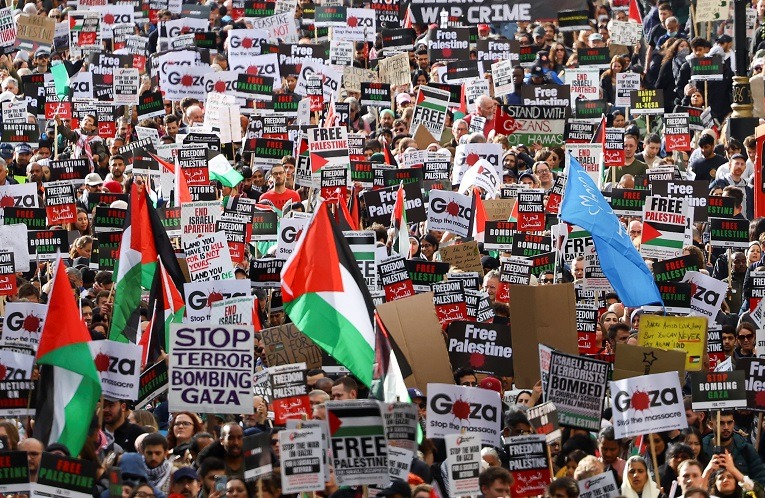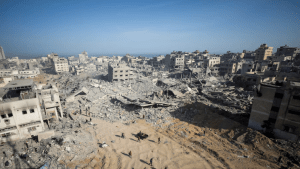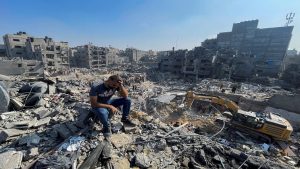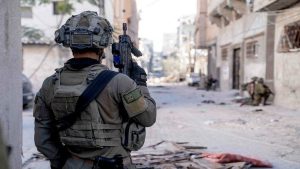United Nations (UN) flags are flying at half-mast around the world. UN staff, led by Secretary-General António Guterres, observed a moment of silence in respect to the more than 100 UN colleagues killed since the start of the Israeli-Hamas war, more than a month ago.
The UN Agency for Palestinian Refugees, known as UNRWA, confirmed that 101 of its employees in Gaza had been killed in the Israeli military response.
It makes it the deadliest conflict for the United Nations in such a short period of time.
These sombre reflections come at a time when the UN Security Council is again considering a draft resolution, demanding urgent humanitarian pauses.
It also includes an initial pause of five consecutive days to allow for rescue and recovery operations in the Gaza Strip.
Guterres led a moment of silence with his senior staff while the general workforce also gathered in a quiet tribute to their lost colleagues in Gaza, as the plight of children in particular, caught up in this war, increasingly comes into sharp focus.
The Director-General of the World Health Organisation, Dr Tedros Ghebreyesus says, “On average, a child is killed every 10 minutes in Gaza. The children and parents of Gaza and Israel want and need the same thing that my family wanted and needed: peace and security.”
Non-permanent member, Malta, introduced a draft security council resolution over the weekend. In its early form, it demands urgent humanitarian pauses with an initial pause of five consecutive days to enable urgent rescue and recovery operations for children missing in damaged and destroyed buildings in the Gaza strip for humanitarian access to children held as hostages, and to allow for full, rapid, and unhindered humanitarian access, including provisions of water, electricity, fuel, food, and medical supplies.
Hakim Muhammed Matar from the Emergency Department at the Al Shifa Hospital in Gaza City says, “Some patients undergo surgery and undergo a quick operation, perhaps without anesthesia or without local anesthetic, meaning, depending on the case, the patient deals with significant pain. The injuries we see are very large. We try to manage this pain as best we can, but ultimately we choose to preserve this patient’s life.”
With the health system in Gaza on its knees, medical staff continue to work beyond the limits of what is acceptable, including at Al Shifa-Gaza’s largest medical complex, which has been caught in the crossfire.
The UN has confirmed the deaths of two premature babies and ten other patients at the facility due to a power outage that started on Saturday.
Dr Abdul Rahim Khalifa, a paediatric surgeon at the hospital, says, “Medical supplies are in short supply. Children need intensive care. Some lie on beds in the emergency room because there are no places available in intensive care. Some even remain on the ground in the emergency room, where we can’t provide care for them.”
Israel continues to claim that Hamas uses hospitals and civilian infrastructure to shield its military activities, while Palestinians and rights groups accuse Israel of war crimes for recklessly harming civilians seeking shelter from the conflict.
Director of External Relations at UNRWA, Tamara Alrifai says, “The health system in Gaza is collapsing, and we are following very, very closely the developments around hospitals, especially Al Shifa Hospital. Al Shifa is an iconic hospital in Gaza. It is always the hospital that continues to function across the wars. Yesterday, the Director-General of the World Health Organisation declared that for the last three days, Al Shifa has not received water or electricity and has stopped operating. And that is extremely, extremely dramatic.”
With masses of people struggling to survive, the Security Council simply could not move fast enough to pressure the parties toward greater humanitarian relief on the ground. And even so, desired outcomes would not necessarily be guaranteed.
VIDEO | Israeli-Hamas war I Update from Sherwin Bryce-Pease:






